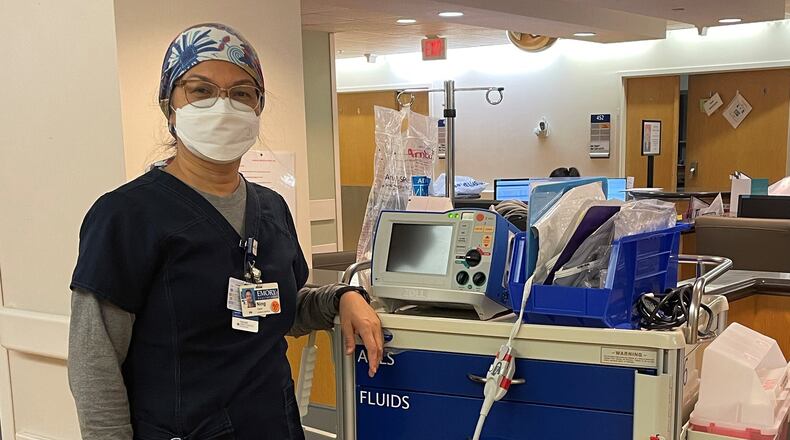Rapid Response nurse Ning Carter was near the end her work shift at Emory Saint Joseph’s in March when she was notified that she was needed to treat a COVID-19 patient having difficulty breathing. It was the first time Carter had heard of COVID-19.
After work, the nurse and her husband had planned to drive to their son’s house to see their new granddaughter, born a few days earlier with Carter nearby in the room.
“Of course, after that (I) realize I can’t see my grandbaby anymore,” Carter said. “It was hard.”
Carter, 60, is a Rapid Response Team nurse at the hospital and provides critical care to patients during her 12-hour overnight shift. She described parts of her journey treating COVID-19 patients to The Atlanta Journal-Constitution and said the vaccine will give her a sense of relief. She received her first vaccine dose Dec. 19 and was set to receive the second dose Saturday.
“If I can have the vaccine, I can have immunity and I can take care of myself so that I can take care of others,” Carter said. “It is my job. It is my responsibility.”
Carter said she believes masks are a major armor in the war on COVID-19. And as she tells her twin 24-year-old sons, “You have to respect this thing.”
Carter said COVID-19 was an unknown disease at the start of the pandemic but now, while it’s still deadly, medical professionals are able to attack it more strongly.
“More (people) seem to be surviving because of the treatments that are initiated,” she said.
Emory Saint Joseph’s didn’t share the number of beds occupied by COVID-19 patients with the AJC. However, it reports a 92% overall survival rate for patients with the illness.
Between February 17, 2020 and January 5, 2021 the hospital admitted more than 8,400 patients with COVID-19 and 587 died, according the hospital website.
The nurse said in the early days of COVID, many patients were in their 70s and arrived at the hospital weak, dehydrated and barely able to breathe. During the current wave of new cases, she said patients are younger, ranging in age from 20s to 50s.
Carter said she’s spent most of her more than 30 years in the nursing profession at Emory Saint Joseph’s and was hired there in 2000.
It’s disheartening, she said, to not be able to bond with patients in the way she could before the pandemic. Before she was called to her first COVID emergency on that March day, Carter was casually chatting in the room of a patient that she had grown fond of.
She would greet new patients with a smile and offer her hand to put them at ease and get a sense of their comfort or nervousness about being in the hospital, and also to gauge if they felt cold or hot, she said.
But now, she is completely covered in her personal protective equipment and gear.
“They can’t even see our faces because we are all covered up with masks,” she said.
The holiday season particularly was difficult for patients, she added.
“It was difficult and the family is not there,” she said. “Normally in this kind of situation the family is able to be with their loved one. That’s the tragedy of this thing.”
Carter added that nurses and doctors are vigilant about making daily FaceTime or teleconference calls, connecting patients and family members who want to be with their loved ones.
“Nobody dies by themselves because we’re there, but it would’ve been a lot more peaceful for the patients if they had their families,” she added. “Just imagine in the beginning when we had a lot of elderly patients. They are sick already. Normally the family would be there helping us.”
Carter said she’s hopeful the pandemic will end.
“We can defeat this virus,” she said.
About the Author
The Latest
Featured



